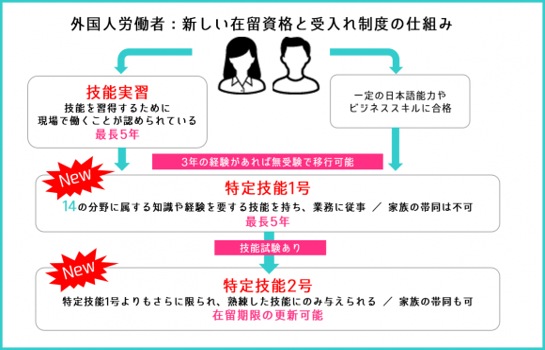特定技能(1号)(2号)とは? 外国人求人でチェックすべきポイント(2)
平成30年12月8日,第197回国会(臨時会)において「出入国管理及び難民認定法及び法務省設置法の一部を改正する法律」が成立し,同月14日に公布されました(平成30年法律第102号)。 この改正法は,在留資格「特定技能1号」「特定技能2号」の創設,出入国在留管理庁の設置等を内容とするもの。
日本政府が、外国人労働者の受け入れ拡大に大きく舵を切ることになりました。
改正された法律は2019年4月1日に施行され、「特定技能ビザ」という新しい在留資格が創設されました。
受け入れ見込み人数は2019年4月1日から5年間で最大345,150人とされています。 1号の在留期間は上限5年。2号は上限を設けず、配偶者・子の帯同が可能です。
●該当する業種
-
特定技能(1号) 14業種
漁業,飲食料品製造業,外食産業,介護職,農業,宿泊業,ビルのクリーニング業,素形材産業,産業機械製造,航空業,電気および電子機器関連産業,自動車整備業,建設業,造船および船舶工業
-
特定技能(2号) 2業種
建設と造船・舶用工業の2業種のみ
●資格要件・仕組み
-
「特定技能1号」
「特定技能1号」は、「相当程度の知識または経験を要する」外国人労働者のための在留資格です。14業種が対象で在留資格の上限が通算5年。家族の帯同はできません。
-
「特定技能2号」
「特定技能2号」は、「熟練した技能を要する」外国人労働者のための在留資格です。建設と造船・舶用工業の2業種のみが対象で在留期間の上限はなく、家族帯同が認められています。
どちらも外国人労働者の報酬額は日本人と同等以上であることが条件です。 -
資格の取得方法
「1号」は各業種の所轄省庁がつくった試験に合格するか、技能実習生として3年間の経験が必要です(後者の場合、試験は免除)。
「2号」は、さらに水準の高い試験に合格する必要があります。当面は試験の数は少ないため、技能実習生が「1号」に移行するケースがほとんどで、今後、「特定技能」で在留資格を得る外国人労働者が徐々に増えていくことになりそうです。
※なお、在留資格は33種類あり、それぞれに定められた活動や配偶者などの地位によって在留が認められていたり日本における滞在期間や滞在中にできる活動内容が変わります。
就労によって在留資格が認められている外国人も就労の内容によって在留資格の種類は異なり、認められた活動以外の活動は認められていません。 -
What is the specific skill (No. 1) (No. 2)? Points to be checked by foreigners’ jobs (2)
-
Overview
On December 8, 2018, the “Department to Immigration Control and Refugee Recognition Act and the Act to Amend the Ministry of Justice Establishment Act” were enacted at the 197nd National Diet (temporary meeting) and were promulgated on the 14th of the same month 30 years law No. 102). The revised law includes the establishment of the status of residence “specific skills No. 1” and “specific skills No. 2” and the establishment of the Immigration Control Agency.
The Japanese government has made great strides in expanding the acceptance of foreign workers.
The revised law came into force on April 1, 2019, and a new status of residence status, named “Specific Skill Visa”, was created.
The number of people expected to be accepted is said to be up to 345,150 in five years from April 1, 2019. The maximum period of stay for No. 1 is 5 years. There is no upper limit for No. 2 and it is possible to have a spouse-child band. -
Applicable industry
●Specific skills (No. 1) 14
Fishery, food and drink manufacturing industry, restaurant industry, nursing care, agriculture, lodging industry, building cleaning industry, shaped material industry, industrial machinery manufacturing, aviation industry, electrical and electronic equipment related industry, automobile maintenance industry, construction industry, Shipbuilding and ship industry
●Specific skills (No. 2) 2 Industries
Only two industries: construction and shipbuilding / marine industry
-
Qualification requirements / structure
● “Specific skill 1”
“Specific Skill No. 1” is a status of residence for foreign workers who require “a considerable amount of knowledge or experience”. A total of 14 industries are eligible, with a maximum residence status of 5 years. You can not have a family band.● “Specific skill 2”
“Specific Skill 2” is a status of residence for foreign workers who require “skilled skills”. Only the two industries of construction, shipbuilding and marine industry are eligible, and there is no upper limit to the period of stay, and family zones are permitted.
The condition is that the compensation for foreign workers is equal to or greater than that of Japanese. - How to obtain qualifications
- “No. 1” must pass the exam created by the responsible ministry of each industry or have 3 years of experience as a technical interns (in the case of the latter, the exam is exempt).
“No. 2” needs to pass higher level exams.For the time being, the number of examinations is small, so in most cases the technical intern shifts to “No. 1”, and in the future, it seems likely that the number of foreign workers who obtain residence status in “specific skills” will gradually increase. is.
※ In addition, there are 33 types of residence status, and the status of the activities and spouses, etc. defined for each status of residence is permitted, and the period of stay in Japan and the activities that can be performed during stay will change.
Foreigners whose status of residence is recognized by employment also differ in the type of status of residence depending on the content of employment, and activities other than recognized activities are not permitted.


leave your comment